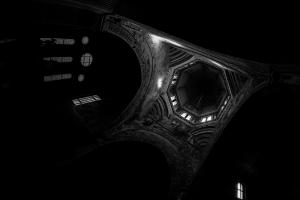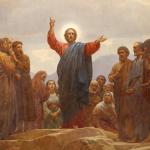 God in Scripture is called the light as it declared him to be the light of the world which knows no darkness: “This is the message we have heard from him and proclaim to you, that God is light and in him is no darkness at all” (1Jn. 1:5 RSV). In this way, Jesus can be shown to be proclaiming his divinity when he called himself the light of the world: “Again Jesus spoke to them, saying, ‘I am the light of the world; he who follows me will not walk in darkness, but will have the light of life’” (Jn. 8:12 RSV). The Word (Λόγος) which is God is said to be light (φως) and life (ζωη) because he is God: “In him was life, and the life was the light of men” (Jn. 1:4 RSV).
God in Scripture is called the light as it declared him to be the light of the world which knows no darkness: “This is the message we have heard from him and proclaim to you, that God is light and in him is no darkness at all” (1Jn. 1:5 RSV). In this way, Jesus can be shown to be proclaiming his divinity when he called himself the light of the world: “Again Jesus spoke to them, saying, ‘I am the light of the world; he who follows me will not walk in darkness, but will have the light of life’” (Jn. 8:12 RSV). The Word (Λόγος) which is God is said to be light (φως) and life (ζωη) because he is God: “In him was life, and the life was the light of men” (Jn. 1:4 RSV).
Because Scripture affirmed the relationship between the divinity with light, Dionysius in the Divine Names affirmed that light is a name which can be used to designate God:
For the light is from the Good, and an image of the Goodness, wherefore also the Good is celebrated under the name of Light; as in a portrait the original is manifested. For, as the goodness of the Deity, beyond all, permeates from the highest and most honoured substances even to the lowest, and yet is above all, neither the foremost outstripping its superiority, nor the things below eluding its grasp, but it both enlightens all that are capable, and forms and enlivens, and grasps, and perfects, and is measure of things existing, and age, and number, and order, and grasp, and cause, and end; so, too, the brilliant likeness of the Divine Goodness, this our great sun, wholly bright and ever luminous, as a most distant echo of the Good, both enlightens whatever is capable of participating in it, and possesses the light in the highest degree of purity, unfolding to the visible universe, above and beneath, the splendours of its own rays, and if anything does not participate in them, this is not owing to the inertness or deficiency of its distribution of light, but is owing to the inaptitude for light-reception of the things which do not unfold themselves for the participation of light. No doubt the ray passing over many things in such condition, enlightens the things after them, and there is no visible thing which it does not reach, with the surpassing greatness of its own splendour. Further also, it contributes to the generation of sensible bodies, and moves them to life, and nourishes, and increases, and perfects, and purifies and renews; and the light is both measure and number of hours, days, and all our time.[1]
By calling God light, Christian tradition is talking about the activity of God. God enlightens the world. God provides the illumination necessary for wisdom and understanding for those enlightened by him similar to the way the sun shines its light upon the world allowing those in the world to see by that light. Dionysius explained the relationship between the name of light for God with a portrait which manifests the image of the Good, so that it is the revelation and glory of the Good (and the Good is itself another name and title for God). Likewise, the light which shines from God was often understood by patristic commentators of Scripture to be the light of Genesis 1:3 (“Let there be light”) because this light was manifest in creation before the emergence of the sun. God gave forth a spiritual light, and only later a secondary, material light was created which served as but an echo of the divine light which nonetheless can serve as a symbol for the greater light of God.
Dionysius, in his description of light, explained how it represented the activity of God in creation as he enlightens it with his goodness. Thus, Dionysius set up the way for the denial of the name of light as being proper to God’s nature. In the Mystical Theology, as God is said not to be called power or said to possess power, Dionysius added: nor [is God] light.
The denial of God being light served an important theological function because it could be seen as a refutation of many forms of dualism which had become common. Such dualism taught there were two opposing forces, one that was good which was light, and one which was evil which was darkness. They were understood to be contending against each other, and in the process of their fight, the darkness captured some of the light, imprisoning it from within. Salvation was understood to happen when elements of the light are freed from the darkness and are able to return to their good origin in the light.
By denying God is light, Dionysius was able to denial any such dualistic cosmological speculation, thereby affirming the “Oneness of God.” For by denying God is light, Dionysius was able to deny any possible opposition to God, opposition which forms the basis of any dualistic cosmology by declaring light and darkness to be two such opposing principles. To deny God is light is to deny darkness can stand in opposition to God, because the darkness is not some equal and opposite power to God but only to the light which emerges from the activity of God. Kataphatic theology takes the activities of God and uses them to suggest names for God, providing conventional truths which we can use to discuss God. But the danger lies in the way we engage such conventions. Discursive logic, taking the names as absolutes instead of conventions, ends up with dualistic speculations, such as suggesting that darkness is a principle which opposes God because God is said to be light. To overturn such presumption, the names which are conventionally applied to God, like light, must be absolutely denied to God so that the errors of discursive logic can be denied, allowing us then in turn to accept the name conventionally for its usefulness when engaging kataphatic theology.
Dionysius is at once able to embrace the conventional names given to God in Scripture while denying the mistakes which occur when such attributions are seen as absolute. God in his activity creates all manifestations of light, spiritual and physical. As we know God in and through his economic activity with us, we can affirm him with names which demonstrate that activity. God is able to be called light because we know him to generate it for us even though we know God transcends his economic activity and so he transcends the light, making him not light but its source and origin.
[IMG=Black White Picture of Monastery [Public Domain] via pxhere]
[1] Dionysius, Divine Names. Trans. James Parker (London: James Parker and Co,, 1897), 36-7.
Stay in touch! Like A Little Bit of Nothing on Facebook












